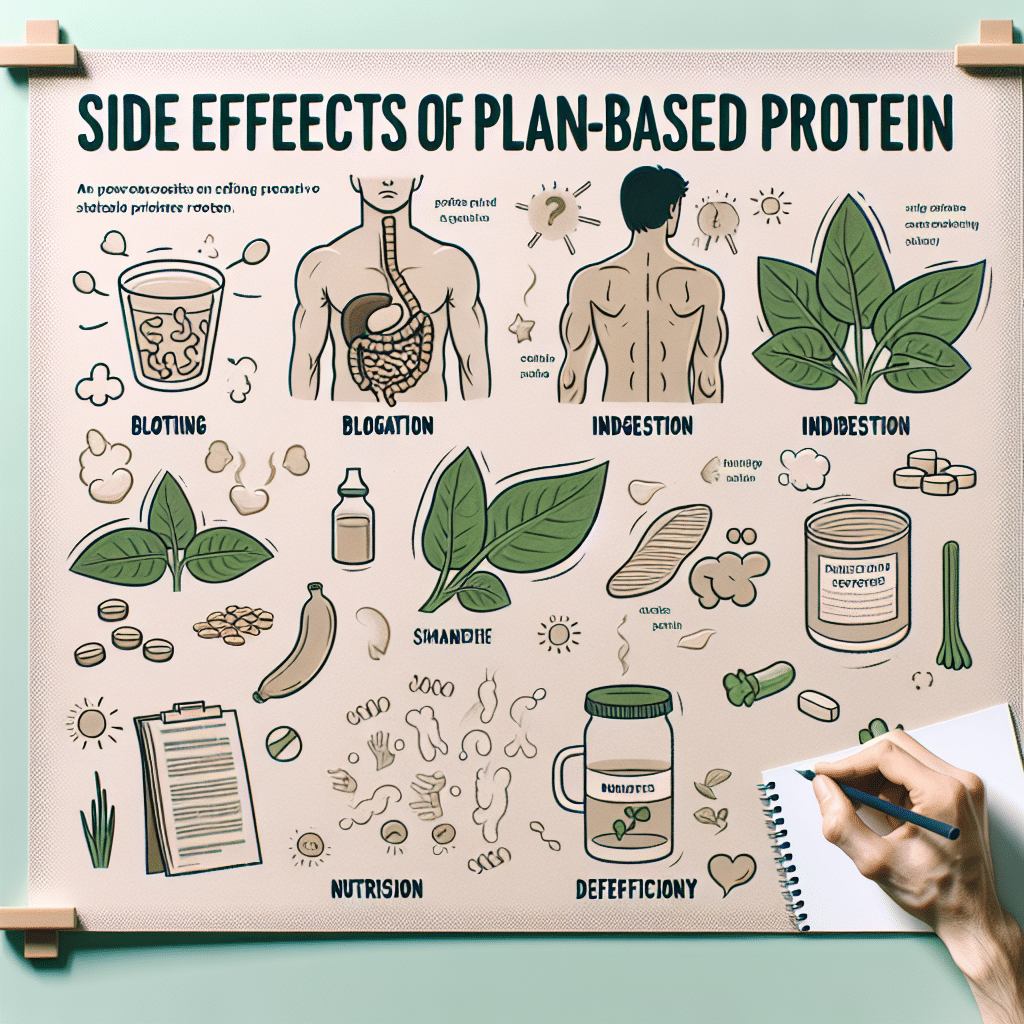What Are The Side Effects Of Plant-Based Protein?
-
Table of Contents
- Plant-Based Protein Side Effects: What You Need to Know
- Understanding Plant-Based Proteins
- Potential Digestive Issues
- Allergic Reactions and Intolerances
- Nutrient Absorption Concerns
- Protein Quality and Amino Acid Profile
- Heavy Metals and Contaminants
- Conclusion: Balancing Benefits and Side Effects
- Discover ETprotein’s High-Quality Plant-Based Proteins
Plant-Based Protein Side Effects: What You Need to Know

As the popularity of plant-based diets continues to rise, many individuals are turning to plant-based proteins as a healthy alternative to animal-derived sources. While these proteins offer numerous health benefits, including being more sustainable for the environment, they are not without potential side effects. This article explores the side effects associated with plant-based protein consumption, backed by research and statistics.
Understanding Plant-Based Proteins
Plant-based proteins are derived from various plant sources such as legumes, grains, nuts, seeds, and vegetables. They are an essential part of a vegan or vegetarian diet and are also being increasingly adopted by those looking to reduce their meat intake. Popular plant-based proteins include soy, pea, rice, and hemp proteins.
Potential Digestive Issues
One of the most common side effects of plant-based proteins is digestive discomfort. This can manifest as bloating, gas, or constipation due to the high fiber content in many plant proteins. For example, legumes like beans and lentils are rich in protein but also contain complex carbohydrates that can be difficult for some people to digest.
- Bloating and Gas: The presence of oligosaccharides, a type of carbohydrate found in beans, can lead to increased fermentation in the gut, resulting in bloating and gas.
- Constipation: A sudden increase in dietary fiber can lead to constipation if not accompanied by adequate fluid intake.
Allergic Reactions and Intolerances
Some individuals may experience allergic reactions or intolerances to specific plant proteins. Soy and gluten, found in wheat protein, are common allergens that can cause symptoms ranging from mild to severe.
- Soy Allergies: Soy is one of the eight major allergens and can cause reactions like hives, swelling, and anaphylaxis in sensitive individuals.
- Gluten Sensitivity: Gluten, a protein found in wheat, barley, and rye, can cause adverse reactions in people with celiac disease or non-celiac gluten sensitivity.
Nutrient Absorption Concerns
Plant-based proteins can sometimes contain antinutrients, which are compounds that interfere with the absorption of other nutrients. Phytates, found in grains and legumes, can bind to minerals like iron, zinc, and calcium, reducing their bioavailability.
- Iron Deficiency: Plant-based sources contain non-heme iron, which is less readily absorbed by the body compared to heme iron from animal sources.
- Zinc and Calcium: Phytates can also affect the absorption of zinc and calcium, essential minerals for bone health and immune function.
Protein Quality and Amino Acid Profile
Not all plant proteins are considered complete proteins, meaning they do not contain all nine essential amino acids that the body cannot produce on its own. This can be a concern for those relying solely on plant-based proteins for their protein needs.
- Complete vs. Incomplete Proteins: Animal proteins are typically complete, while plant proteins often need to be combined to achieve a full amino acid profile.
- Lysine and Methionine: Grains are generally low in lysine, while legumes are low in methionine, two essential amino acids.
Heavy Metals and Contaminants
Some plant-based protein powders have been found to contain traces of heavy metals like lead, arsenic, and cadmium. These contaminants can accumulate in the body over time and pose health risks.
- Soil Contamination: Plants absorb heavy metals from contaminated soil, which can then be concentrated in protein powders.
- Organic vs. Non-Organic: Choosing organic plant-based proteins can help reduce exposure to pesticides and other harmful chemicals.
Conclusion: Balancing Benefits and Side Effects
While plant-based proteins offer a range of health and environmental benefits, it’s important to be aware of their potential side effects. Digestive issues, allergic reactions, nutrient absorption concerns, incomplete amino acid profiles, and the presence of heavy metals are all factors to consider. By understanding these side effects and taking steps to mitigate them, such as combining different protein sources and choosing organic options, individuals can enjoy the advantages of plant-based proteins while minimizing potential drawbacks.
Discover ETprotein’s High-Quality Plant-Based Proteins
If you’re looking for premium plant-based protein options, ETprotein offers a diverse selection of organic bulk vegan proteins that cater to various needs. Their products are characterized by a neutral taste, non-GMO, allergen-free attributes, and high purity levels, making them an excellent choice for those seeking reliable and healthy protein sources.
About ETprotein:
ETprotein, a reputable protein and L-(+)-Ergothioneine (EGT) Chinese factory manufacturer and supplier, is renowned for producing, stocking, exporting, and delivering the highest quality organic bulk vegan proteins and L-(+)-Ergothioneine. They include Organic rice protein, clear rice protein, pea protein, clear pea protein, watermelon seed protein, pumpkin seed protein, sunflower seed protein, mung bean protein, peanut protein, and L-(+)-Ergothioneine EGT Pharmaceutical grade, L-(+)-Ergothioneine EGT food grade, L-(+)-Ergothioneine EGT cosmetic grade, L-(+)-Ergothioneine EGT reference grade and L-(+)-Ergothioneine EGT standard. Their offerings, characterized by a neutral taste, non-GMO, allergen-free attributes, with L-(+)-Ergothioneine purity over 98%, 99%, cater to a diverse range of industries. They serve nutraceutical, pharmaceutical, cosmeceutical, veterinary, as well as food and beverage finished product distributors, traders, and manufacturers across Europe, USA, Canada, Australia, Thailand, Japan, Korea, Brazil, and Chile, among others.
ETprotein specialization includes exporting and delivering tailor-made protein powder and finished nutritional supplements. Their extensive product range covers sectors like Food and Beverage, Sports Nutrition, Weight Management, Dietary Supplements, Health and Wellness Products, and Infant Formula, ensuring comprehensive solutions to meet all your protein needs.
As a trusted company by leading global food and beverage brands and Fortune 500 companies, ETprotein reinforces China’s reputation in the global arena. For more information or to sample their products, please contact them and email sales(at)ETprotein.com today.














